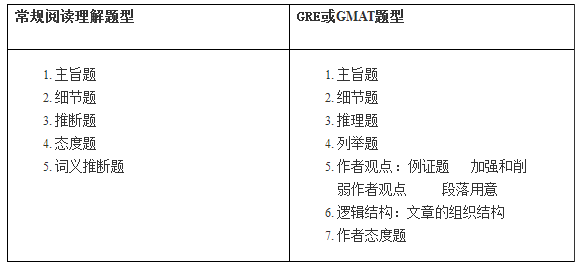考博英语中GRE阅读中主旨题的解题策略
全国有些院校的考博英语阅读理解都选自GRE,LSAT或者GMAT,如北京师范大学,华中科技大学,重庆大学等院校的考博英语真题。不同的是选项由五个选项改为四个,每篇阅读理解改为了五道题。
我们先了解一下这种考试的来源, GRE的全称是美国研究生入学考试,GMAT指的是经企管理研究生入学考试,LSAT指的是法学院入学考试,这三种考试难度比我们国内研究生入学考试难度大,而且出题套路也不一样,无论对于出国留学的学生还是考博的学生来说都是噩梦。因此我们有必要对比一些这几种考试和国内考试的区别,调整做题的策略,才能顺利通过考试。
一、GRE或GMAT和(常规)四六级或者考研阅读理解的区别:

二、解题步骤调整
考博英语中首先要浏览五道题的题干,理解题干问的究竟是什么,并标记出关键词,并初步判断题目的类型,注意细节题和推理题有时间区别不是很明显,有些题是明显的推理判断题。
比如题干中出现了imply 或者infer这样的词,区别不明显的不要担心,只要找出定位的关键词,认真理解原文的细节,根据答案选择即可。
第二步,按照以往的解题步骤,就是边看文章边按照题干寻找定位了,但是这样文章出题很少题文同序的,因此要先通读文章了解整篇文章的主旨和结构,但是绝不是一字一句将文章从头到尾翻译一遍,因为文章的话题包罗万象,如考古,物理,生物,地理,心理,历史,文学评论,要想能够非常通顺的把文章都翻译一遍难度是巨大的,考试时间上也是不允许的,所以我们在读文章的时候应该重点关注文章的主要观点有哪些,作者的态度是什么,细节的东西大致浏览一下不用细致理解,方便做到细节题时回到原文定位。
第三步是解题,主旨题可以直接根据第一遍的阅读答题,细节题要回答文中定位,认真对比选项,注意读文章的时间要小于做题的时间。
主旨题考察的是文章整体的把握能力,对于议论文来说,每篇文章都有一个主题以及针对这个主题的若干观点,解释,举例,我们要做的是区分观点和概括作者的行文思路,区分作者反驳和支持的观点或者文章直接证明的观点说明的现象或者事物,根据解题的经验,作者往往支持新观点反对旧观点,解题的关键是重视第一段,每段的开头和结尾和最后一段。
尤其时要重点理解转折词后的内容,因为转折词(however,but等)后的内容才是作者真正想说的。记叙文通常没有主题句,我们必须通过作者叙述的事情进行升华和概括,记叙文的主旨是通过一些细节展现的,如动作,心理,环境等细节描写。
三、主旨题的干扰类型:
1.与中心无关
2.具体细节而不是概括全文
3.没有涉及
4.与文章主旨相反
5.太笼统
【实例分析】
It is frequently assumed that the mechanization of work has a revolutionary effect on the lives of the people who operate the new machines and on the society into which the machines have been introduced. For example, it has been suggested that the employment of women in industry took them out of the household, their traditional sphere, and fundamentally altered their position in society. In the nineteenth century, when women began to enter factories, Jules Simon, a French politician, warned that by doing so, women would give up their femininity. Friedrich Engels, however, predicted that women would be liberated from the “social, legal, and economic subordination” of the family by technological developments that made possible the recruitment of “the whole female sex into public industry.” Observers thus differed concerning the social desirability of mechanization’s effects, but they agreed that it would transform women’s lives.
Historians, particularly those investigating the history of women, now seriously question this assumption of transforming power. They conclude that such dramatic technological innovations as the spinning jenny, the sewing machine, the typewriter; and the vacuum cleaner have not resulted in equally dramatic social changes in women’s economic position or in the prevailing evaluation of women’s work. The employment of young women in textile mills during the Industrial Revolution was largely an extension of an older pattern of employment of young, single women as domestics. It was not the change in office technology, but rather the separation of secretarial work, previously seen as an apprenticeship for beginning managers, from administrative work that in the 1880’s created a new class of “dead-end” jobs, thenceforth considered “women’s work.” The increase:in the numbers of married women employed. outside the home in the twentieth century had less to do with the mechanization of housework and an increase :in leisure time for these women than it did with their own economic necessity and with high marriage rates that shrank the available pool of single women workers, previously, in many cases, the only women employers would hire.
Women’ s work has changed considerably in the past 200 years, moving from the household to the office or the factory, and later becoming mostly white-collar instead of blue-collar work. Fundamentally, however, the conditions under which women work have changed little since before the Industrial Revolution: the segregation of occupations by gender, lower pay for women as a group, jobs that require relatively low levels of skill and offer women little opportunity for advancement all persist,-while women’s household labor remains demanding. Recent historical investigation has led to a major revision of the notion that technology is always inherently revolutionary in its effects on society. Mechanization may even have slowed any change in the traditional position of women both in the labor market and in the home.
1.Which of the following statements best summarizes the main idea of the Passage?
A.The effects of the mechanization of women' s work have not borne out the frequently held assumption that new technology is inherently revolutionary.
B. Recent studies have shown that mechanization revolutionizes a society's traditional values and the customary roles of its members.
C. The mechanization of work creates whole new classes of jobs that did not previously exist.
D.The mechanization of women' s work, while extremely revolutionary it its effects, has not, on the whole, had the deleterious effects that some critics had feared.
【解题思路】:
第一段首句分析:
结构划分:It 作形式主语,that引导主语从句,主语从句中的主干是the mechanization of work has a revolutionary effect on the lives of the people and the society. who 引导定语从句修饰people, into which...引导定语从句修饰the society.
句意:工作的机械化对操作新机器的人以及引入机器的社会有革命性的影响,而后面是举例无需细读。
作用分析:根据It is frequently assumed that ...可知该句是大部分人的观点
第一段末句指出尽管观察家对机器化的影响的社会期许观点不一,但是他们都认为机械化改变了女性的生活。
作用分析:起到一个承上启下的过渡句的作用,引出第二段的新观点。
第二段首句提出历史学家的观点:Historians, particularly those investigating the history of women, now seriously question this assumption of transforming power. They conclude that such dramatic technological innovations as the spinning jenny, the sewing machine, the typewriter; and the vacuum cleaner have not resulted in equally dramatic social changes in women’s economic position or in the prevailing evaluation of women’s work.
尤其时研究女性历史的历史学家严肃地对机械化改变力量的假设。他们得出这样的一个结论,即像多轴纺织机,缝纫机,打字机和真空吸尘器这样的发明没有导致女性经济地位或者对女性工作的普遍评价的同样巨大的社会变革。
作用分析:如果说第一段相当于提出一个普遍的观点或者旧观点,第二段提出一个新观点来质疑第一段的观点,即工业化对女性的工作的影响并没有第一段首句提出的那么巨大。
第三段转折处:Fundamentally, however, the conditions under which women work have changed little since before the Industrial Revolution的意思是从根本上来说,女性工作的条件从工业革命以来几乎没有变化。
作用分析:属于段落主题句,支持第二段提出的新观点。此句之后是用具体的论据支持本段中心句。
末段倒数第二句Recent historical investigation has led to a major revision of the notion that technology is always inherently revolutionary in its effects on society. 总结了最近历史学家的观点的价值,作者认为最近历史学家的研究极是对科技对社会的影响总是革命性的这一观点重大修正。最后一句Mechanization may even have slowed any change in the traditional position of women both in the labor market and in the home指出机械化甚至可能减缓了女性在劳动力和工作中传统地位的变革,该句是直接提出了跟普遍观点相反的意见。
【选项分析】
【A】 The effects of the mechanization of women' s work have not borne out the frequently held assumption that new technology is inherently revolutionary
机械化对女性工作的影响不能证明新技术本质上是革命性的这一普遍的观点 。A选项的观点跟最近历史学家的观点相一致,也是作者支持的观点,只不过换了一种表述说法。因此A选项符合文章的主旨。
【B】 Recent studies have shown that mechanization revolutionizes a society's traditional values and the customary roles of its members.
最近的研究表明机械化使一个社会的传统价值和社会成员的传统角色发生革命性变化。
该选项与中心不符,本文讨论的使机械化对女性的工作的影响而不是对社会的传统价值。
【C】 The mechanization of work creates whole new classes of jobs that did not previously exist.
工作的机械化创造了以前没有的新的社会工作类别。
该选项不能概括本文的中心,文章中也没有提到。解主旨题时应排除文章中涉及的具体细节。
【D】The mechanization of women' s work, while extremely revolutionary it its effects, has not, on the whole, had the deleterious effects that some critics had feared.
尽管女性工作的机械化有革命性的影响,但是没有一些评论家担心的有害效应。
D与文章主旨相反,文章认为女性工作的机械化没有革命性的影响甚至还会削弱女性在工作和家庭中的传统地位的变革。
总结:
主旨题的解题一定要把握文章的整体结构,重视文章各个段落的开头结尾,标记好观点句和概括性的句子。
想看更多考博英语复习方法与技巧,请关注华慧考博网(www.hhkaobo.com)一个专业的考博英语培训平台。每天都为您更新最新最全的考博咨讯以及考博真题资料!
相关推荐:
1、gt;全国各院校2020年考博英语真题资料
2、医学考博英语2020年VIP考博通关班
3、2020年华慧考博英语培训VIP通关班
4、华慧考博各院校考博专业课真题下载









